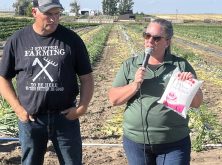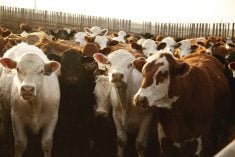WINNIPEG — In the last year, 41 groups have met with or contacted Environment Minister Steven Guilbeault to talk about agriculture. That number is from the Office of the Commissioner of Lobbying, which operates the lobby registry.
The registry keeps track of groups that meet with or send letters to federal officials, like ministers, senators and members of Parliament.
Related story: Environment minister claims carbon tax support
Read Also

Short rapeseed crop may put China in a bind
Industry thinks China’s rapeseed crop is way smaller than the official government estimate. The country’s canola imports will also be down, so there will be a lot of unmet demand.
It’s possible to search the registry to get this information. In the last 12 months, Guilbeault met with or heard from the following groups:
- Grain Growers of Canada
- Canadian Cattle Association
- Canadian Federation of Agriculture
- Dairy Farmers of Canada
- Many others, including Greenpeace and the David Suzuki Foundation
Not listed in the lobby registry is the National Farmers Union.
Most farm and commodity groups in Canada are registered, including small organizations like the Alberta Sugar Beet Growers and the dairy farmers of Prince Edward Island.
The NFU meets with politicians and its members send letters to ministers, senators and MPs, urging them to take action on agricultural policies like farmland ownership and foreign labour and it held a National Lobby Day in Ottawa last November.
Photos are regularly posted on social media showing NFU reps standing next to MPs and ministers.
Yes, the NFU does lobby the federal government but it is not registered because its lobbyists are volunteers, said Mara Shaw, NFU executive director.
“The vast majority of those who lobby on behalf of NFU policies are unpaid farmers volunteering their time. We have referred to this aspect of the regulations: “A person must be paid to communicate with the federal government to be a lobbyist under the Lobbying Act. Volunteers and citizens acting on their own behalf do not need to register.”
The current NFU president is rethinking that position, because this past winter, the government released new rules for lobbyists that may require the NFU to register.
“With this new guidance that I understand came out just this year … it’s given a bit more clarity, or described it in a different way, that looks like it applies to us,” said Jenn Pfenning, NFU president and an organic farmer from New Hamburg, Ont.
“Obviously we’ve never made a secret of our positions and we’re happy when we’re able to post that we’ve met with a minister … we’re not keeping that under wraps. It simply was an interpretation issue (of the registry).
“It’s really important to me to not be outside of the rules that are there for good governance,” said Pfenning.
As part of the registration process, farm groups must provide information on their membership and activities. When NFU representatives go to Ottawa, they represent a wide swath of farmers and lobby on behalf of the membership, Pfenning said.
“We are a general farm organization with direct membership of thousands of farmers across the country,” she said, adding data shows the NFU represents a diverse range.
“It’s not a feeling as much a statistical data point. I’m a farmer, we farm about 700 acres of organic vegetables…. There are grain farmers and cattle farmers (in the NFU).
“We do have a variety of sizes and the gamut of agricultural types, from animal husbandry to market gardens and large grain farms…. There are members across the country of varying sizes.”
According to the NFU’s website, the organization’s current board of directors does not include a commercial sized grain farmer or a large-scale livestock producer.
Contact robert.arnason@producer.com
















